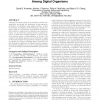Free Online Productivity Tools
i2Speak
i2Symbol
i2OCR
iTex2Img
iWeb2Print
iWeb2Shot
i2Type
iPdf2Split
iPdf2Merge
i2Bopomofo
i2Arabic
i2Style
i2Image
i2PDF
iLatex2Rtf
Sci2ools
124
click to vote
GECCO
2009
Springer
2009
Springer
Evolution of robust data distribution among digital organisms
This paper describes a study of the evolution of robust communication, specifically the distribution of data among individuals in a population, using digital evolution. In digital evolution, a population of self-replicating computer programs exists in a user-defined computational environment and is subject to instruction-level mutations and natural selection. To encourage the evolution of this cooperative behavior, we make use of “digital germlines,” a form of grouplevel selection similar to multicellularity in biology. The results of experiments using the Avida platform for digital evolution demonstrate that populations of digital organisms are capable of evolving to distribute data in a network, and that through the application of different selective pressures, these digital organisms can overcome communication obstacles such as message loss, limited bandwidth, and node failure. Categories and Subject Descriptors I.2.8 [Computing Methodologies]: Artificial Intelligence—Pro...
Artificial Intelligence | Digital Evolution | Digital Evolution Demonstrate | Digital Organisms | GECCO 2009 |
Related Content
| Added | 26 May 2010 |
| Updated | 26 May 2010 |
| Type | Conference |
| Year | 2009 |
| Where | GECCO |
| Authors | David B. Knoester, Andres J. Ramirez, Philip K. McKinley, Betty H. C. Cheng |
Comments (0)

